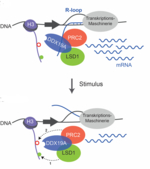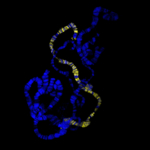Epigenetics ensures placenta functioning
If the development of blood vessels in the placenta is impaired, fetal growth retardation may result. Scientists from the German Cancer Research Center (DKFZ) and the Mannheim Medical Faculty of Heidelberg University discovered that the correct development of functioning blood vessels in the mouse placenta is controlled epigenetically: One of the enzymes that modify gene activity using methyl groups is responsible.
https://www.gesundheitsindustrie-bw.de/en/article/press-release/epigenetics-ensures-placenta-functioning

